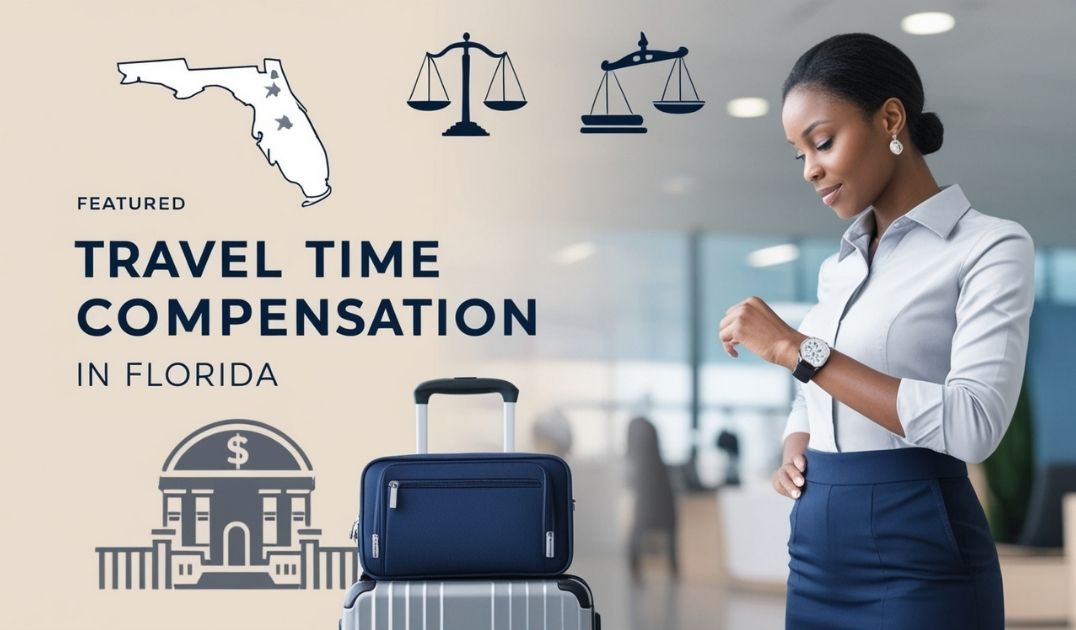Introduction
What Is Florida State Law On Having For Travel TimeAs travel becomes an increasingly common part of the workday, understanding when time spent on the road is legally considered “work time” is crucial. In Florida, travel time compensation follows both federal laws, like the Fair Labor Standards Act (FLSA), and specific state guidelines, particularly for public sector employees. These regulations specify when travel is considered compensable work time, covering situations from standard work travel to special cases like overnight stays or emergency travel.
Key Takeaways
- Travel Time Compensation: Not all travel qualifies for compensation; eligibility depends on factors like time, purpose, and mode of travel.
- Federal vs. State Law: The FLSA sets federal guidelines, but Florida has unique statutes for state employees.
- Compensable Work Time: Regular, non-exempt employees often receive compensation for work-related travel beyond regular commute hours.
- Specific Guidelines for State Officers: Public employees in Florida have distinct protocols, including required authorization forms for travel expenses.
- Overtime and Reimbursement: Travel time that extends beyond 40 hours a week may qualify for overtime pay, depending on the nature of the travel.
Compensable Travel Time
In Florida, determining whether travel time counts as compensable work time is based on specific criteria. Let’s look at the key factors in detail:
1. Purpose of the Travel
- Work-Related vs. Personal Commute: The purpose behind the travel is crucial. Travel specifically required by your employer for work-related tasks is generally considered compensable, meaning you should be paid for that time.
- Example: If you’re traveling to a meeting, training, or another job site for your employer, this is work-related travel and often paid. However, if you’re simply commuting from home to your regular work location, this is usually not paid time.
2. Regular Work Hours
- Time of Day Matters: If travel occurs during your regular work hours, it is generally compensable. The law recognizes time within normal working hours as part of your job, whether you’re in the office or on the road.
- Example: Suppose you have a regular work schedule of 9 a.m. to 5 p.m., and you’re asked to travel to another office location at 10 a.m. This travel time typically qualifies as compensable work time because it falls within regular hours.
3. Employer Requirements
- Required vs. Voluntary Travel: If your employer requires you to travel for specific tasks, this usually counts as work time. Voluntary travel, however, like attending an optional work event, may not be paid.
- Example: Let’s say your employer requires you to visit a client site. This mandatory travel should be paid, as it’s essential for the role. Conversely, if you choose to attend a weekend training workshop, travel time may not qualify for compensation unless the employer specifically requests your attendance.
4. Location and Duration of Travel
- Between Job Sites vs. Home-to-Work: Travel between job sites during the day is almost always compensable, as it’s considered part of your workday. However, commuting from home to the primary work location at the start and end of the day is generally not paid.
- Example: If you work in multiple locations, moving from one site to another for work tasks during the day is paid travel. But driving from home to work in the morning and back home in the evening is typically viewed as your personal commute and is unpaid.
Federal Travel Time Rules Under FLSA
The Fair Labor Standards Act (FLSA) provides guidelines on when travel time should be counted as paid work time, focusing mainly on non-exempt employees (those eligible for overtime). Here’s a clear breakdown of how different types of travel time are treated under FLSA:
1. Home-to-Work Travel (Commuting Time)
- Generally Unpaid: Commuting from home to your primary work location and back home is typically not considered paid work time. This daily commute is seen as part of an employee’s personal responsibility.
- Exceptions: If an employer requires you to report to a different location that’s farther or otherwise unusual, like a special job site, there may be exceptions, and some or all of this commute time could be paid.
- Example: For instance, if you usually commute 15 minutes to your office, but your employer asks you to drive an hour to a temporary job site, they might pay for the additional travel time.
2. Travel Within the Workday (Between Job Sites)
- Always Compensable: When travel occurs during the workday, such as moving between job sites or offices to complete work tasks, this is considered paid time. Since it directly supports work duties, it falls under compensable work hours.
- Example: Suppose you’re a technician who needs to travel from one client’s location to another during your shift. This time spent traveling between clients is considered work time and is paid accordingly.
3. Overnight Travel (Out-of-Town or Extended Travel)
- May Be Compensable if During Work Hours: When travel requires an overnight stay or an out-of-town trip, FLSA rules typically make travel during regular work hours compensable. This applies even on weekends, as long as the travel falls within your normal work hours.
- After-Hours Travel: Travel outside of regular work hours on overnight trips may not be paid unless you’re actively working (like preparing reports or answering emails). However, each case can vary depending on employer policies.
- Example: If you normally work 9 a.m. to 5 p.m. and your employer sends you on an overnight trip where you’re traveling from 10 a.m. to 2 p.m., that time is usually paid. However, if you travel from 7 p.m. to 11 p.m., it might not be compensated unless you were completing specific work duties.
Quick Reference Table: FLSA Travel Time Scenarios
| Travel Type | Is It Compensable? | Description |
|---|---|---|
| Home-to-Work | No, typically not | Standard commute from home to worksite |
| Travel Between Job Sites | Yes | Travel within workday, between multiple job sites |
| Overnight Travel (During Work Hours) | Yes | Travel requiring overnight stay during work hours |
| Emergency Situations | Yes, depending on situation | Time spent on urgent, job-related travel |
Florida State Law on Travel Time
Florida state law closely aligns with the FLSA on travel time policies. However, it also includes unique considerations for public employees, including specific requirements for travel reimbursements and overtime.
- 2024 Florida Statutes: These outline how travel expenses are handled for public officers and employees.
- Public Employees and Authorization Forms: State employees must submit a travel authorization request form to justify expenses.
- Overtime Rules: State employees may be eligible for overtime if travel time extends beyond their normal 40-hour workweek.
Types of Compensable Travel in Florida
In Florida, whether travel time is paid depends on the nature of the travel and the specific rules that apply. Here are some of the most common types of compensable travel situations employees and employers encounter:
1. Job-Site Travel
- Definition: Job-site travel refers to situations where employees must travel between job sites or client locations as part of their workday.
- Compensation Requirements: When travel between job sites occurs within normal working hours, it is considered compensable. This is because the time is directly related to job duties, and employees are fulfilling employer requirements during these hours.
- Example: If you work as a construction manager and visit several work sites throughout the day, the time spent moving from one site to another qualifies as paid work time. This is different from commuting from home to the first job site or the final commute back home, which is generally not paid.
2. Overnight Trips and Out-of-Town Travel
- Definition: Overnight or out-of-town travel occurs when employees are required to stay overnight for work, typically due to the distance or nature of the task.
- Compensable Hours: For overnight travel, any travel that happens during regular work hours is generally paid, even if it occurs on non-work days like weekends. Hours spent traveling outside of the regular work schedule may not be paid unless work is actively performed during travel (such as answering emails or preparing reports).
- Example: If your normal work schedule is from 9 a.m. to 5 p.m. and you travel to a conference, departing at 10 a.m. and arriving at 3 p.m., those hours are usually paid. However, if you travel from 7 p.m. to 11 p.m., this time might not be compensable unless you are actively working or meeting a specific business need during that time.
3. Emergency Travel
- Definition: Emergency travel refers to unplanned, urgent travel required to handle a business-critical issue, such as emergency repairs, unexpected client needs, or situations that require immediate employee presence.
- Compensation Guidelines: Emergency travel is usually considered compensable, especially if it requires the employee to leave immediately or travel outside of regular work hours. This aligns with the need for flexibility and responsiveness in critical situations, ensuring that employees are compensated fairly for their immediate availability.
- Example: If you are a technician and your employer calls you for an emergency repair at a distant job site, the time spent traveling to that location would typically be paid, even if it’s outside your normal hours.
4. Travel Time for Public Officers and State Employees
Public officers and state employees in Florida must follow specific protocols for travel time, which include additional rules around documentation and justification. These requirements are in place to ensure transparency and fair use of state resources.
- Authorization Forms: State employees must submit a travel authorization request form before embarking on official travel. This form justifies the purpose and expense, ensuring the travel is authorized and necessary. Without this form, employees may not qualify for reimbursement of expenses.
- Regular and Overtime Hours: Travel time that exceeds the regular work hours may qualify for overtime pay if it’s necessary for job duties. Florida’s wage and hour laws align with federal overtime guidelines, which means that if state-required travel pushes an employee over 40 hours in a work week, they are often entitled to overtime pay.
- Mode of Travel Justifications: State officers must justify their mode of travel, especially if it involves flights, rental vehicles, or significant mileage. This protocol is in place to verify that state resources are used efficiently and appropriately. In some cases, employees may need to justify why they didn’t use a more economical mode of travel if available.
Overnight and Out-of-Town Travel in Detail
Overnight or out-of-town travel often requires employees to be away from their regular workspace, which changes how compensable hours are calculated:
- Travel During Regular Hours: If an employee’s travel falls within their usual work hours, it generally qualifies as compensable, regardless of whether it’s a weekday or weekend.
- After-Hours Travel: Travel outside regular hours (such as evenings) may not be paid unless the employee is actively working or engaged in tasks relevant to the employer.
- Documentation for Reimbursement: State employees often need to keep records and receipts for travel-related expenses to qualify for reimbursement. Some employers may also offer a per diem to cover meals and lodging during these trips.
Compensable Travel Types
| Type of Travel | Compensable | Details |
|---|---|---|
| Job-Site Travel | Yes | Travel between work sites during the day counts as paid time. |
| Overnight/Out-of-Town Travel | Yes, if during regular hours | Overnight travel during work hours is paid; after-hours travel may not be unless active work is involved. |
| Emergency Travel | Yes | Paid if travel is necessary for critical work duties, even if it’s outside regular hours. |
| Public Officers/State Employees | Yes, with authorization | Travel for official duties requires authorization and justifications for expenses and mode of travel. |
Travel Expenses and Reimbursement
Travel reimbursements in Florida cover costs such as lodging, meals, and mileage.
- Per Diem Rates: Employees on overnight travel are typically eligible for per diem allowances to cover expenses.
- Uniform Travel Authorization: State employees must use this form to justify their travel costs.
- Approved Expenses: Covered expenses must align with the official business requirements.
Commonly Reimbursed Travel Expenses
| Expense Type | Covered? | Details |
|---|---|---|
| Mileage | Yes | Based on pre-approved mileage rate |
| Meals and Lodging | Yes | Covered if travel requires overnight stay |
| Public Transport | Yes, with approval | Reimbursed when necessary for business travel |
| Incidentals | Sometimes | Case-by-case basis, depending on employer’s policy |
Special Categories of Travel in Florida
Several unique travel types exist under Florida law, especially for state officials:
- Class B and Class C Travel: Florida differentiates between overnight (Class B) and same-day (Class C) travel for public employees.
- Executive Branch and State Agency Travel: Employees within these sectors have distinct rules, including a predetermination for all travel expenses.
- Law Enforcement Travel: Law enforcement officers in Florida are often required to travel for assignments, with specific compensation rules applying.
Overtime and Travel Time Considerations
For non-exempt employees, travel time that goes beyond the standard 40-hour workweek may be compensable as overtime. Key factors include:
- Extended Work Hours: Travel exceeding 40 hours can often lead to overtime eligibility.
- Commute Exceptions: In rare cases, if commuting time is outside the normal hours due to work requirements, it may qualify for compensation.
Overtime Eligibility for Travel Scenarios
| Travel Scenario | Overtime Pay Eligibility | Notes |
|---|---|---|
| Regular Commute | No | Typically not compensable |
| Workday Job-Site Travel | Yes | Eligible if over 40-hour workweek |
| Overnight Business Travel | Yes, for non-exempt | Paid if travel is during work hours |
| Emergency Travel | Yes, if over regular hours | Compensable in most cases for state employees |
Conclusion
Navigating travel time compensation in Florida can feel complex with the blend of federal and state rules, but understanding these guidelines is essential. As an employee, knowing my rights means I can ensure I’m fairly compensated for time spent on the road, whether it’s routine travel between job sites or an unexpected overnight stay due to work demands.
For employers, setting up clear travel policies and reimbursement procedures helps prevent misunderstandings and ensures compliance with both FLSA regulations and Florida-specific statutes.









